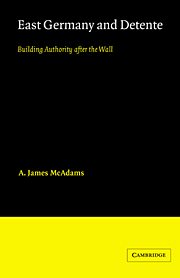7 - CONCLUSION
Published online by Cambridge University Press: 17 September 2009
Summary
THE GDR AND DETENTE
On 26 September 1984, after months of inter-German wrangling over appropriate agendas and timetables, Erich Honecker was supposed to have begun an official visit to the FRG. This would have been the first time ever that an East German Party head had traveled to West Germany, and Honecker would have been received with full diplomatic honors by the Federal President. In addition, his scheduled sidetrip to the land of his birth in the FRG's Saar region would have added to the heavy symbolism of the event, reminding observers in both states anew of a distant but still shared past. Even more remarkable, Honecker's visit was to have come at a time of deeply exacerbated tensions between the superpowers, lending irrefutable testimony to the ability of both Germanies to perpetuate a special detente in spite of their surroundings.
Nevertheless, on 4 September, East German officials announced that this long-awaited visit would again have to be postponed, ostensibly because of opposition to the trip from within the governing circles of the CDU. As in the past, however, the real story behind the failure of the visit was considerably more complex. As such, it serves to bring home, once again, one of the central themes of this book: the inherent historical tension behind the East Germans' attempts to mesh their own country's interests with a complex and ever-changing political environment.
- Type
- Chapter
- Information
- East Germany and DetenteBuilding Authority after the Wall, pp. 193 - 200Publisher: Cambridge University PressPrint publication year: 1985

